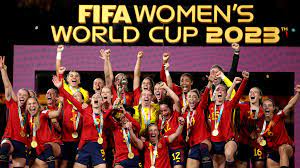By Andrew Warshaw
September 19 – Spanish women’s football has been plunged into yet more controversy and confusion after a raft of players continued to refuse to play for the national team despite new interim head coach Montse Tomé naming 15 of the World Cup‑winning squad for upcoming Nations League fixtures.
Although their strike was reported last week to be over as they agreed a minimum wage pay deal with clubs and Liga F, the players say they will not play for the national team until wide-scale reforms are made at the federation in the wake of the Luis Rubiales “kissgate” scandal.
The former Spanish FA president resigned three weeks after he kissed midfielder Jenni Hermoso on the lips following Spain’s triumph in Sydney, an action that prompted an unprecedented worldwide backlash.
Over 80 Spain players went on strike and despite Rubiales’ resignation and coach Jorge Vilda being sacked, 39 players maintained their stance in a statement late Monday, demanding more structural change.
Interestingly, Tome did not select Hermoso in the squad, saying it was to protect her.
“Protect me from what? And from whom?” Hermoso responded on X, formerly Twitter. “We have been searching for weeks – months, even – for protection from the RFEF that never came. The people who now ask us to trust them are the same ones who today disclosed the list of players who have asked NOT to be called up.”
Hermoso further accused the Spanish federation of seeking to “intimidate and threaten” the World Cup players by calling them up against their will. She said the federation’s decision to select nearly half the 39 players who won’t play for the national team as a protest was “irrefutable proof” that “nothing has changed.”
All the players chosen by Tome who were in the 39 collectively published a statement on social media, including two-time Ballon d’Or winner Alexia Putellas, saying they won’t back down even though they could face heavy fines and even lose their licenses.
They also noted they believe the squad was not named soon enough for Nations League qualifiers against Sweden and Switzerland on September 22 and 26. “We regret that once more our federation has put us in a position in which we never wanted to be in,” they said.
Once again the crisis has led to government involvement with Victor Francos, president of Spain’s sports council, telling a radio station: “I will call a series of players and I will talk to them, the government has the obligation to intervene.”
He said he had already spoken to RFEF interim president Pedro Rocha and that he would ask the players to change their minds about playing in the Nations League games, which could give Spain a path to the 2024 Olympics.
“We have the obligation to show up and try to solve a problem,” added Francos.
Tome, meanwhile, argued that she spoke to the players before calling them up.
“I trust in that the players are professionals, they have just become champions of the world, they love the national team, and I know they will be here with us tomorrow,” she told a news conference.
That could be wishful thinking.
Contact the writer of this story at moc.l1751371733labto1751371733ofdlr1751371733owedi1751371733sni@w1751371733ahsra1751371733w.wer1751371733dna1751371733

